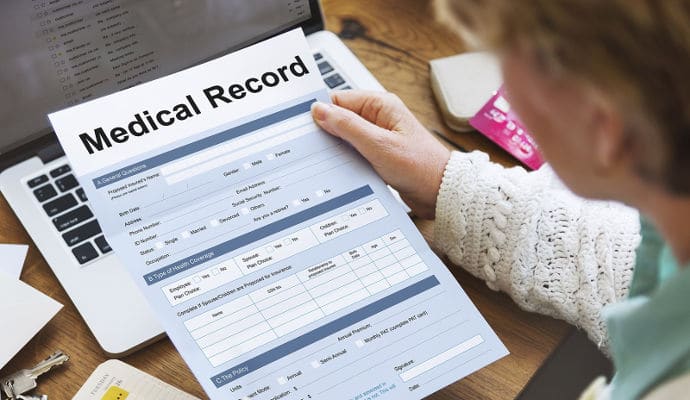
Get a copy of medical records to make caregiving easier
Having copies of your older adult’s medical records means having their medical history at your fingertips.
Knowing important details about their health conditions helps you make more informed decisions about their care.
You’ll also be able to make sure there are no errors in their files and quickly share critical information with medical professionals during an emergency.
We explain who can request medical records and what types of records are available. We also share 2 ways to get them and 5 commonly asked questions about getting a copy of medical records.
Who can request medical records?
HIPAA regulations keep health information private. Under these regulations, the patient has the right to request their own medical records.
Caregivers who have written permission, hold the medical power of attorney, or are the legal guardian also have the right to request those medical records.
Which medical records are available?
Most healthcare providers like doctors, hospitals, and labs are required to keep adult medical records for at least 6 years.
Records that you’re able to get include:
- Notes or records that the provider created themselves
- Diagnostic results that the provider has copies of – includes blood tests, X-rays, mammograms, genetic tests, biopsies, etc.
- Information provided by another doctor that was used for diagnosis or treatment
2 ways to get a copy of medical records for seniors
1. Download them electronically
If your older adult’s health care organizations have provided access to online systems with electronic medical records (EMR), you can download the medical records.
2. Submit a request
Most organizations require that a form be filled out to request medical records. These forms are usually available at their office or by email, fax, or mail.
If a form isn’t available, ask the organization what information is required to make a request and include it in a letter.
It may take some time for the organization to give you the records. State laws vary, but most require delivery in 30 to 60 days.
In case there are any issues getting the medical records, keep a copy of your original request. You'll need it when filing a complaint with the U.S. Department of Health and Human Services or with the state medical board.
5 commonly asked questions about getting a copy of medical records
1. How much does it cost to request medical records?
You may be charged a reasonable fee for the medical records. This will likely depend on if they’re delivered on paper, by fax, or electronically.
2. Can the records be denied if medical bills haven’t been paid?
No. Medical records can’t be withheld if your older adult has outstanding medical bills with that organization.
3. What can be done if the doctor has retired or is no longer practicing?
Under the law, all medical records must still be maintained even after a doctor retires or is no longer practicing medicine.
The medical records must be transferred to another health care provider or archived with a commercial storage company.
4. What if I’m not able to contact the doctor’s office?
If the doctor closes their practice and there isn’t any information about where their records were transferred, there are still a few options for finding your older adult's medical records.
- Contact the state medical board or medical society. If the doctor is still practicing, these organizations should have their current contact information.
- Contact the health insurance company. If the doctor is still part of their network, they’ll have the current contact information.
- Contact the hospital that the doctor was affiliated with – they should have contact information on file.
5. If medical records aren’t available from a specific doctor, what are the options?
Even if medical records aren’t available from a doctor who treated your older adult in the past, you can still put together information about their health conditions and treatments during that time.
Start by reviewing insurance claims from that time period to find out which labs, pharmacies, hospitals, or specialists were used. Contact them directly to get copies of test results, files, or other records.
Even if you don’t recover all their records, you’ll still get useful information with important details about your older adult’s medical history.
Review records and correct errors
Accurate information is needed to make sure your older adult gets the best care possible.
After getting a copy of your older adult’s medical records, be sure to review them to make sure there are no errors.
If you do find errors or missing information, call that provider and ask them to make corrections immediately.
Next Step Find out why having copies of medical records improves your older adult’s health
Recommended for you:
- 6 Reasons Why Getting a Copy of Medical Records Improves Senior Health
- 7 Tips for Helping Seniors at the Doctor: Being a Health Advocate
- Keeping a Dementia Journal Makes Caregiving Easier: 7 Things to Track
By DailyCaring Editorial Team
Image: CrystalGraphics
[optin-monster slug=”yxbytm35zhsdfopnw7qk”][optin-monster slug=”jvhyplxmb4umsjazxecn”]
About the Author

Connie Chow
Connie was a hands-on caregiver for her grandmother for 20 years. (Grandma made it to 101 years old!) She knows how challenging, overwhelming, and all-consuming caring for an older adult can be. She also knows how important support is — especially in the form of practical solutions, valuable resources, and self-care tips.




